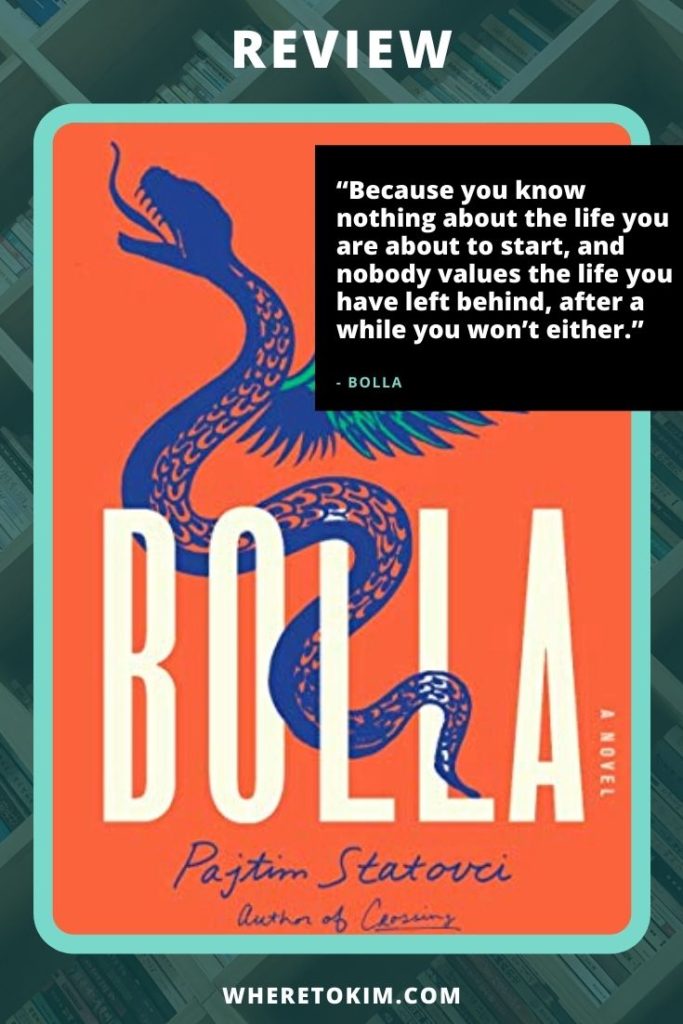Bolla by Pajtim Statovci is a dark and tragic story told by a man whose mental and physical freedom is limited by the world he lives in.
Location: mainly Kosovo
Bolla synopsis
April 1995. Arsim is a 24-year-old, recently married student at the University of Pristina, in Kosovo, keeping his head down to gain a university degree in a time and place deeply hostile to Albanians. In a café he meets a young man named Miloš, a Serb. Before the day is out, everything has changed for both of them, and within a week two milestones erupt in Arsim’s married life: his wife announces her first pregnancy and he begins a life in secret.
After these fevered beginnings, Arsim and Miloš’s unlikely affair is derailed by the outbreak of war, which sends Arsim’s fledgling family abroad and timid Miloš spiraling down a dark path, as depicted through chaotic journal entries. Years later, deported back to Pristina after a spell in prison and now alone and hopeless, Arsim finds himself in a broken reality that makes him completely question his past. What happened to him, to them, exactly? How much can you endure, and forgive?
Entwined with their story is a re-created legend of a demonic serpent, Bolla; it’s an unearthly tale that gives Arsim and Miloš a language through which to reflect on what they once had. With luminous prose and a delicate eye, Pajtim Statovci delivers a relentless novel of desire, destruction, intimacy, and the different fronts of war.
Book review
The story of Arsim and Miloš takes place during the Serbian occupation of Pristina (Kosovo) and after. I can feel their distress, their lack of direction and unhappiness, and also the end of their hopes and dreams when they realize that the life they could have had may never be. Bolla is a dark and tragic story. Do not read this book if you want to avoid sex scenes between men, including one with a minor, and violence.
Hardship jumps off the pages
The setting is vividly described and the scenes come to life like in a movie. I love the author’s expressive writing style and the translation reads smoothly (although I can’t compare with the original Finnish version). So much is said in one page and you understand a lot about the situation in a very natural way. The feelings embedded in the long sentences sneak up on you like the Bolla the book is named after.
As you progress through the book, it becomes clear that Arsim is mentally torn by the distance between his desired and expressed identity in a country that is not quite his own. He loves a man – the enemy – goes on a (sex) date with a minor and doesn’t know how to be a husband and father within the confines of his traditional family. I can feel his struggle and his need to explore his desires. He has much love to give, but is not free to do so. It is almost as if one part of his life does not exist at the same time as the other.
Both Arsim and Miloš think a lot about their own lives and the lives of others. They wait to see what happens to them and live that way. It feels passive, but what choice do they really have? There are only a few opportunities for change, and they are getting harder and harder to grasp. They take what belongs to them, which is less than it could be. Until Arsim goes after everything that is taken from him….
Conclusion
Bolla really impressed me. It is a very emotional story told by a man whose mental and physical freedom is limited. The pain and the endlessness of it all are expressed in a very effective way. In his thirties, Arsim has had a lifetime’s worth of experiences.
Interested?
Buy your copy of Bolla from Amazon.
Book details
Title: Bolla
Author: Pajtim Statovci
Translator (from Finnish): David Hackston
Language: English
Publisher: Pantheon
Pages: 240
ISBN (13): 9781524749200
Publication date: 6 July 2021
About the author and translator
Pajtim Statovci was born in Kosovo to Albanian parents in 1990. His family fled the Yugoslav wars and moved to Finland when he was two years old. He holds an MA in comparative literature and is a PhD candidate at the University of Helsinki. His first book, My Cat Yugoslavia, won the Helsingin Sanomat Literature Prize for best debut novel; his second novel, Crossing, was a finalist for the National Book Award; and Bolla was awarded Finland’s highest literary honor, The Finlandia Prize. In 2018, he received the Helsinki Writer of the Year Award.
David Hackston is a British translator of Finnish and Swedish literature and drama. He graduated from University College London with a degree in Scandinavian Studies and now lives in Helsinki where he works as a freelance translator. Notable recent publications include the Anna Fekete trilogy by Kati Hiekkapelto, Katja Kettu’s wartime epic The Midwife, four novels by ‘Helsinki noir’ author Antti Tuomainen, and Pajtim Statovci’s enigmatic My Cat Yugoslavia and Crossing.







